SUMMARY
This is AI generated summarization, which may have errors. For context, always refer to the full article.
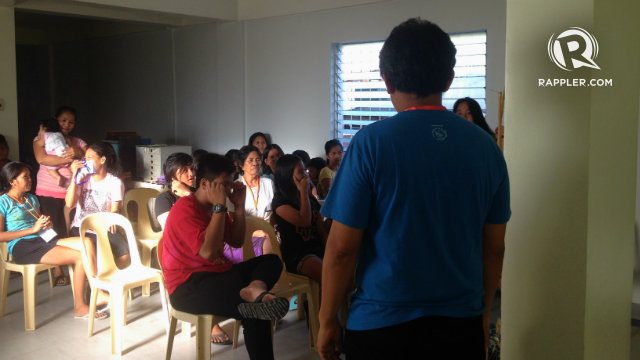
MANILA, Philippines — A dad stands out in a sea of mothers volunteering to teach families about nutrition.
His name is Ricky Tango, just like the dance.
He worked as a security guard for years, only to be laid off. He then found his way through the intricate webs of networking, selling herbal drinks. Business felt like a race, but his pace was quite slow. Ricky then dabbled in carpentry; on other days, he put on a jumpsuit and worked as an electrician.
His wife is a teacher; together, they have 5 children and one grandchild. Life is tough, he said, but they just keep going.
Ricky’s latest gig is weaving rags. He is also a volunteer teacher to hundreds of students, young and old alike.
“Madalas ako ang naiiwan sa bahay, kaya ako ang nagluluto,” said Ricky. “Dapat flexible – nanay at tatay, parehong dapat may knowledge sa nutrition.” (Often times, I’m the one left at home, so I’m the one who cooks. Both mom and dad should be flexible, and have knowledge on nutrition)
The 46-year-old grandfather argued that men should not be afraid to take on more “nurturing roles,” urging fathers to be involved just as much as mothers in looking after their children’s health and nutrition.
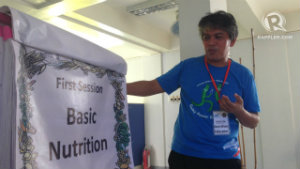
Ricky’s class was about to begin. Today, he had a mix of grandmothers, teenagers, and single moms in class.
Myths
Aside from teaching the basics such as the go, grow, and glow food groups, macro and micronutrients, Ricky also helps families debunk food myths.
He advised parents not to reuse cooking oil over and over. “It’s okay to reuse it once, but it should only be within the day it was first used,” said Kim Mandigma, a dietitian-nutritionist from Children International Philippines, the non-governmental organization (NGO) where Ricky volunteers.
“‘Wag natin tipirin ang ating sarili. ‘Wag na salaain ang mantika lalo na kung itim na o isang linggo na (Let’s not be too thrifty on ourselves. Don’t filter oil anymore, especially if it’s turned black or a week-old),” Mandigma added.
Mandigma explained that such practice can be unhealthy and may increase one’s risk for cancer. “Which is cheaper, cooking oil or hospital bills?”
Ricky also warned parents against buying “mantikang labo” or recycled cooking oil sold in plastic bags among sari-sari stores. “Mag-ingat sa pagbili ng street food, iba’y gamit ay mantikang labo (Be careful buying street food, some use recycled cooking oil).”
Some of his students admitted not knowing whether they use iodized salt or not. “‘Di na nagkakalayo ang presyo ng iodized at regular salt, doon na tayo sa iodized (The price of iodized and regular salt are not that different. Let’s go with iodized),” he urged parents.
A group of teenage friends were the youngest in Ricky’s class. “Nasa 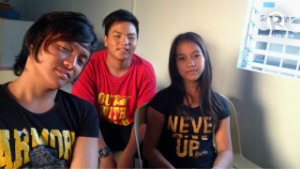
The teenager shared that his family only drinks water during meals, “‘Di kami palainom tubig (We don’t drink water that much).” This can lead to dehydration and other health problems affecting one’s kidney, digestion, and energy.
Prior to attending Ricky’s nutrition classes, a 64-year-old grandmother believed that fish was bad for her family.
“Akala ko dati ‘pag pinakain ang bata ng isda, magkakabulate (I thought that children would get worms from eating fish),” Nemia said.
She pledged to prepare more homemade meals after learning how to budget properly.
Nemia has been raising her 4 grandchildren on her own since her son drifted off to Boracay. The son promised to only work at the beach, but never returned. Meanwhile, her daughter-in-law eloped with another man.
“Kahit P200 kada araw lang budget sa pagkain, kayang malusog pa rin (Even if our daily food budget is only P200, it can still be nutritious),” she learned.
Ricky also taught families how to prepare simple meals like malunggay soup, dinuguang upo, tofu sisig, and mixed seafood and vegetables.
“Education is more sustainable than other projects like feeding,” Mandigma said. “And it’s habit-forming; something that the families can forever keep.”
‘Children not their own’
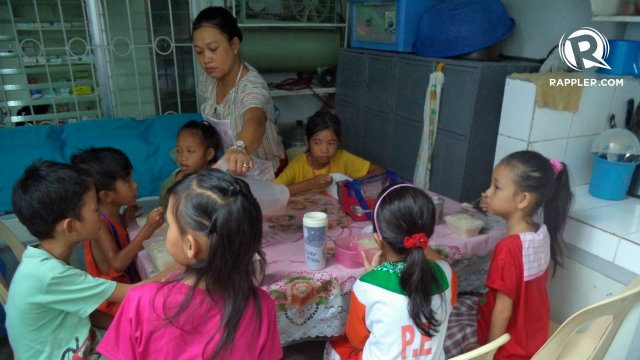
Most of the NGO’s volunteers are women. Ricky is just one of the two men actively participating in its nutrition activities.
Aside from nutrition lessons, Children International also conducts supplementary feeding programs for schoolchildren in which parents cook the meals.
Analyn Raymundo, a mother of 8, admitted to “doing nothing but gamble” before finding her way as a volunteer chef. “Dati hanggang hating-gabi nasa sugalan ako. Nauubos ko sweldo ng asawa ko (I used to gamble until midnight. I wasted my husband’s salary),” she shared.
She added, “Ngayon, gising na ko 5 am para mamalengke para sa mga bata (Now, I wake up at 5 am to go to the market for the kids).”
One day, she decided to try and quit gambling. It was tough, but she made it. For 8 years, her hands have not touched game cards, but only cooking utensils, she quipped.
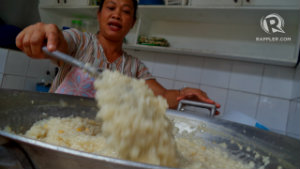
Analyn and Ricky are just some of the many Filipinos who are investing their time and efforts for children not even their own. Imagine a Philippines where there are more of these kinds of parents.
Before that happens, however, many parents must first learn how to better take care of their own children. – Rappler.com
Children International Philippines conducts activities across Manila, Quezon City, Caloocan, Navotas, Malabon, Albay, and Bulacan. To learn more how you can help, visit their website here.
How else can we help fight hunger? Send your stories and ideas to move.ph@rappler.com. Be part of the solution, be part of the #HungerProject.
Add a comment
How does this make you feel?
There are no comments yet. Add your comment to start the conversation.